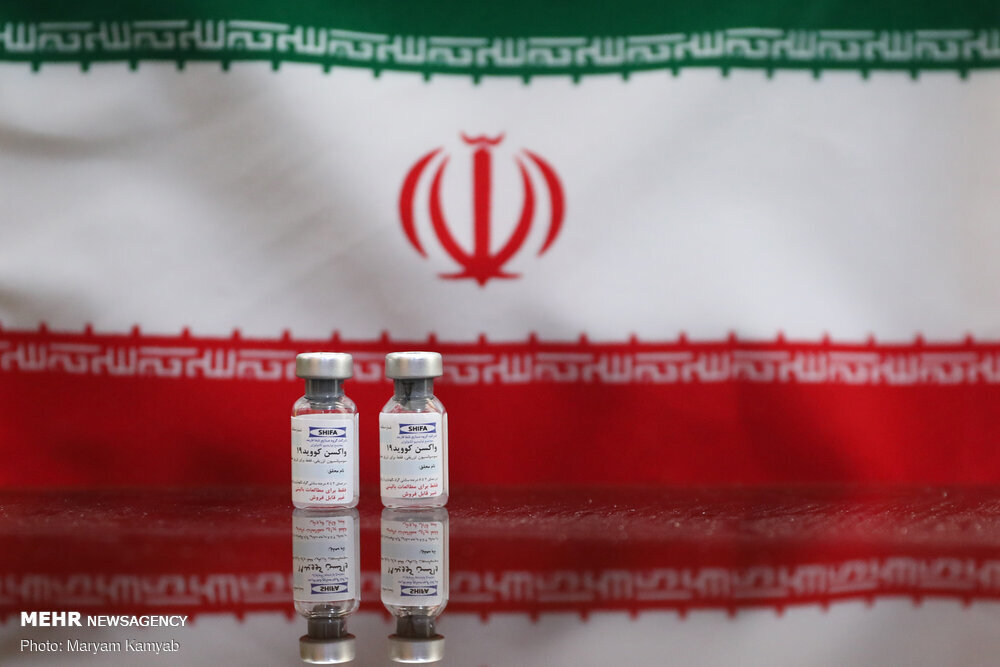Iran tests first homegrown coronavirus vaccine

TEHRAN – COVIRAN BAREKAT, the first coronavirus vaccine made by Iranian researchers, was unveiled and injected into three volunteers during a ceremony on Tuesday.
The first phase of the human trial started for the first COVID-19 vaccine produced by the research group of the Headquarters for Executing the Order of the Imam.
The daughter of Mohammad Mokhber, the head of the Headquarters for Executing the Order of the Imam, was the first volunteer who received the vaccine.
The first injection has been performed successfully with no symptoms such as shock and fever.
“I hope this scientific process will be successful,” Tayebeh Mokhber, the first volunteer to receive the Iranian-made coronavirus vaccine, said.
“I am happy, not only for being the first one to be vaccinated but also for the successful result to ensure people’s health,” she added.
The inauguration ceremony was attended by Health Minister Saeed Namaki, IRIB reported.
Hamed Hosseini, director of the Department of Clinical Studies of the Iranian Coronavirus Vaccine, said that “Today, three volunteers will receive the vaccine and the first phase will continue until 56 volunteers are vaccinated.”
Two injections will be done, the second one will be on day 14, and after 28 days from the last injection, the results will be announced, he stated.
Hojjat Niki-Maleki head of the information center of Headquarters for Executing the Order of the Imam, also said that over 65,000 people have so far expressed readiness to receive the domestically-made COVID-19 vaccine across the country.
According to Niki-Maleki, the production line of the Iranian coronavirus vaccine with a capacity of 1.5 million doses per month will be launched within the next 40 days.
By the next six months, vaccine production will reach up to 12 million doses per month, he said.
In Iran, vaccine platform in several Iranian companies, including in the pharmaceutical department of the Headquarters for Executing the Order of the Imam, the Ministry of Health and the Vice Presidency for Science and Technology.
After vaccination, the candidates must remain in quarantine for a week to a month to show the side effects of the vaccine. In the meantime, the test results are checked several times for blood and cellular immunity.
After the results of the study are determined, the second stage begins with the injection in 500 people, and after 28 days, the third phase begins with mass production.
Mostafa Ghane'ei, an official with the Vice Presidency for Science and Technology, said that the domestically produced COVID-19 vaccine will probably be injected into the whole population by September 23, 2021.
Over a century of vaccine production
On the sidelines of the ceremony, the health minister said those who think that this is for the first time that a vaccine is produced and injected in Iran are deeply wrong. “We had Pasteur Institute in [the Iranian year] 1299 (1920) and had Razi Institute in 1303 (1924). We were the first producer of vaccines in Asia and exported vaccines to many countries of the world.”
Mokhber, for his part, said that in addition to the unveiled vaccine, six other sources are working on producing the coronavirus vaccine. “We are ready to produce 1.5 million doses of the vaccine per month by the next two months.”
Meanwhile, Health Ministry spokesman Kianoush Jahanpour stressed that the production of this vaccine was not required to be approved by the World Health Organization. “Anytime we decided to export the vaccine, we will embark on receiving necessary international certificates.”
FB/MG
